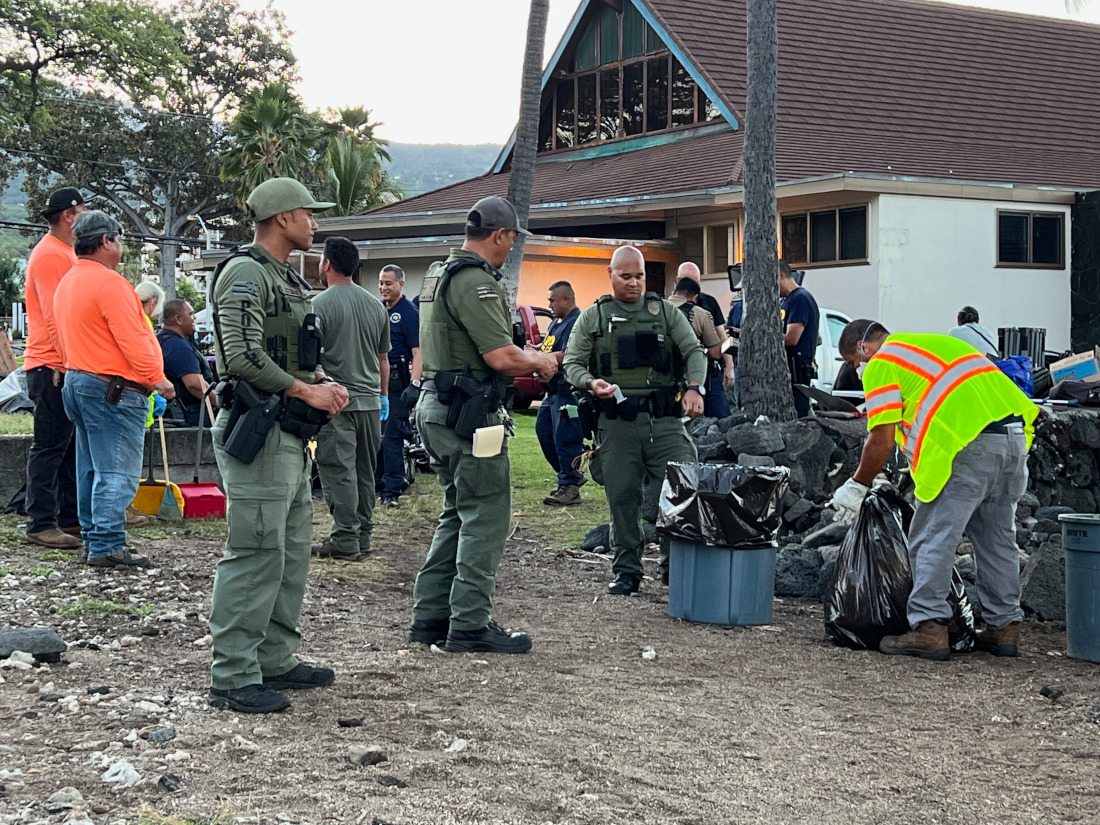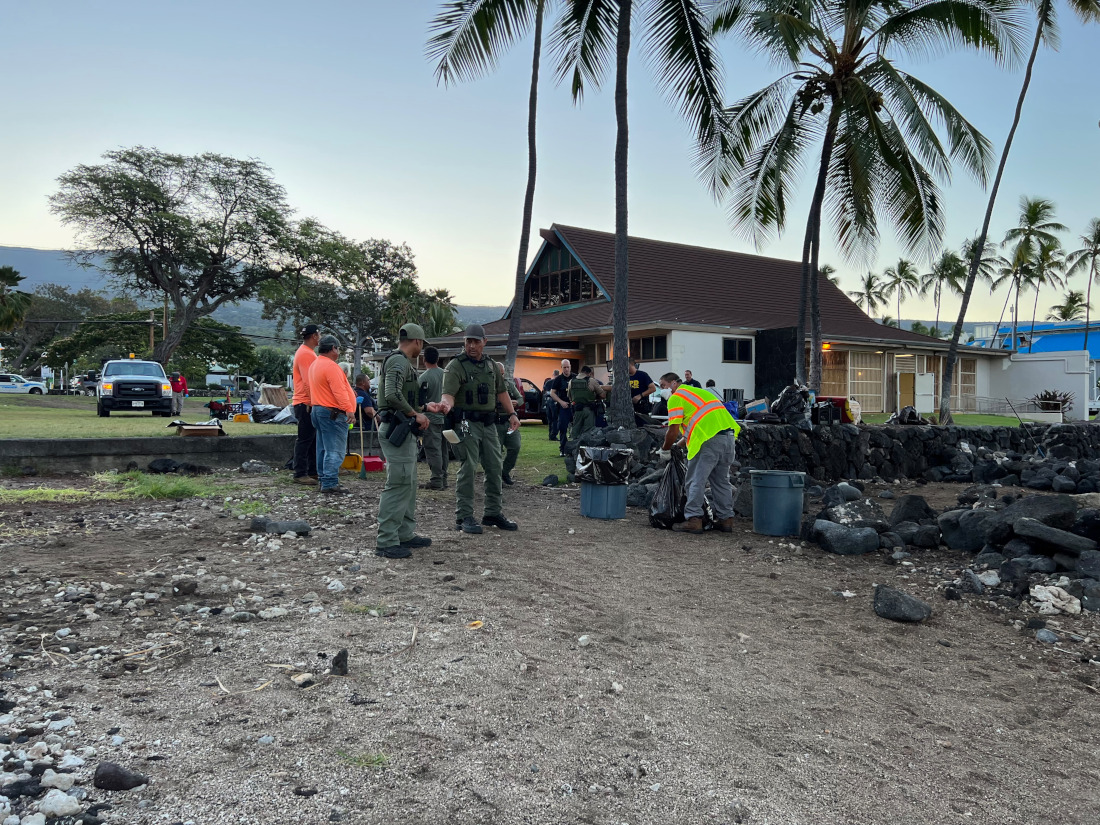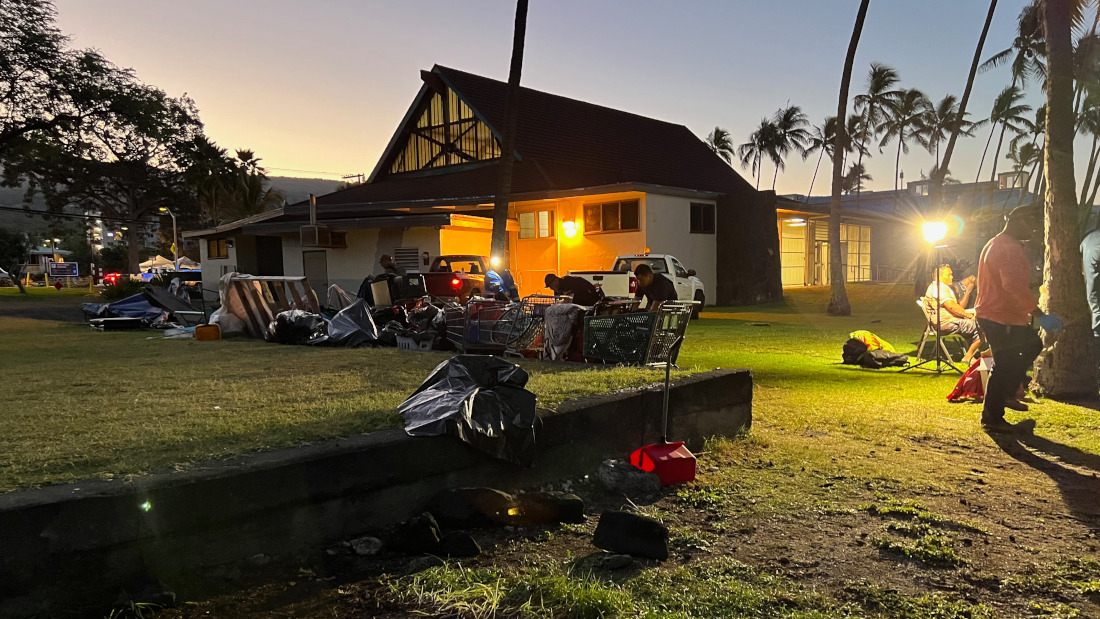
Photo taken by outreach workers at the May 24 Hale Hālāwai sweep courtesy Community Alliance Partners
(BIVN) – The ACLU of Hawai‘i is demanding the County of Hawaiʻi put a halt to future homeless sweeps planned on the Big Island, until adequate shelter or safe spaces are designated.
Both the ACLU of Hawai‘i and Community Alliance Partners issued lengthy news releases on Monday, detailing a recent ACLU letter sent to County officials that demanded a stop to the sweeps. The demand letter followed an enforcement operation at Hale Hālāwai Beach Park in Kona on May 24. The organizations hope to prevent another sweep near the Kona Community Aquatic Center that they say the County plans to carry out on June 7th.
Here is the ACLU of Hawai‘i letter to the County, dated June 2nd (footnotes omitted):
Dear Mayor Roth, Director Messina, Chief Moszkowicz, and Corporation Counsel Strance:
The ACLU of Hawaiʻi Foundation (“ACLU of Hawaiʻi”) has learned that the County of Hawaiʻi (“County”) conducted a sweep on May 24, 2023 that forcibly evicted a group of houseless people from Hale Hālāwai beach park in Kona (“Hale Hālāwai Sweep”). We also learned that the Hale Hālāwai Sweep is just the first in a series of enforcement actions that the County intends to execute against houseless people within the County, including an upcoming sweep planned for June 7, 2023 near the Kona Community Aquatic Center and other locations across Hawaiʻi Island (“Planned Sweeps”).
The County is engaging in these sweeps despite knowing full well that Hawaiʻi County does not have sufficient available shelter space to house the people who have been impacted by these sweeps.
The County’s execution of enforcement actions under these circumstances is constitutionally problematic. In 2019, in Martin v. City of Boise, the federal Ninth Circuit Court of Appeals affirmed the well-established principle that a municipality’s enforcement of an ordinance “violates the Eighth Amendment [to the U.S. Constitution] insofar as it imposes criminal sanctions against homeless individuals for sleeping outdoors, on public property, when no alternative shelter is available to them.” And just this past fall, in Johnson v. City of Grants Pass, the Ninth Circuit — in a separate published opinion — re-affirmed the principle that a municipality “cannot, consistent with the Eighth Amendment, enforce its anticamping ordinances against homeless persons for the mere act of sleeping outside with rudimentary protection from the elements, or for sleeping in their car at night, when there is no other place in the City for them to go.” Here — when houseless people in the County have no safe place to go without being subjected to the County’s laws that punish sheltering in public spaces — enforcement actions like the Hale Hālāwai Sweep and the Planned Sweeps (if the County chooses to move forward with them) violate the mandates of the U.S. and Hawaiʻi constitutions.
In light of this, we write with a demand: The County must stop the Planned Sweeps unless and until the County either stands up emergency shelter spaces that can adequately house Hawaiʻi County’s houseless community, or designates a safe space where houseless community members can exist without being subject — every single day and every single second — to County enforcement actions.
As you may be aware, the ACLU of Hawaiʻi has challenged other unconstitutional enforcement actions on neighboring islands, including in the City and County of Honolulu and in Maui County.
We request a response from the County by 5 p.m. on Monday, June 5. We are open to discussing alternatives with you. If you have any questions or comments regarding this letter, please contact me at 808-522-5905 or wkim@acluhawaii.org.
Sincerely yours,
Wookie Kim
Legal Director
ACLU of Hawai’i

Photo taken by outreach workers at the May 24 Hale Hālāwai sweep courtesy Community Alliance Partners
“Hawaiʻi County has a duty to protect the constitutional rights of the houseless community”, said Carrie Ann Shirota, Policy Director of the ACLU of Hawai‘i, in the news release. “Forcing people to leave under the threat of arrest without access to alternative shelter or safe public spaces violates the Eight Amendment and results in cruel and unusual punishment. These policies are contrary to building safe, healthy, and equitable communities, and further exacerbate trauma experienced by houseless people at the hands of the County and Police Department. Hawai‘i County can and must do better – by focusing on permanent affordable housing options, emergency shelter beds and alternative housing options, along with increased health and support services.”
Community Alliance Partners also issued its own news release about the ACLU letter of demand. After describing the letter, the Community Alliance Partners wrote:
According to Community Alliance Partners, the coalition of Hawaiʻi Island homeless service providers, as of Friday, June 2 all emergency shelter beds on the island were full.
Paul Normann, Executive Director of Neighborhood Place of Puna and co-chair of Community Alliance Partners explained why service providers have continuously asked the county to refrain from conducting sweeps. “When County Leadership orders police to conduct a sweep, they exacerbate the homeless crisis by making it harder for service providers to contact and help people. Beyond that, these sweeps waste taxpayer dollars by pushing people around without providing housing or shelter.”
Carrie Hoʻopiʻi, Hope Services’ Outreach Team Leader, said her team has been trying to track down people they’d been working with at Hale Halawai. “People are afraid to engage. It’s hard to trust anyone on the outside when you are afraid that officers will wake you up at 4:00 am and force you out into the night.”
Aurora Leanillo, a student in Information Technology at Hawaiʻi Community College, understands the distrust that people are feeling. “Imagine going through every day in fear of the police. Imagine constantly worrying that your space will be invaded, and feeling like you have no free will.”
Leanillo was houseless for years, and says that sweeps were a traumatic part of her experience. She knows some of the people who were forced to leave their camp at Hale Hālāwai.
“When you’re living with that kind of fear, it’s hard to know who will help you and who will hurt you,” Leanillo said. “They’re not talking to anybody trying to offer them services, because they have been harmed by people who are supposed to be public servants.”
“I was in a sweep and it was traumatizing to see kūpuna crying and begging to save items they could not carry on their back or in a shopping cart,” said Renee Rivera, a former Hope Services client who was houseless until 2015.
Rivera says that living in an encampment provides safety for people who have lost their homes and have nowhere else to go. “When I was living on the streets, I felt much safer living in an encampment. Even though we couldnʻt lock our doors, we had the security of our community, knowing that someone was always there to look out for us.”
Rivera, who now is the director of He Hoʻomaka Hou Ana O Puna, a nonprofit helping formerly incarcerated women, continued “Women and kūpuna are especially vulnerable to being attacked when they are alone on the streets. Breaking up an encampment is an act of violence.”
The risk associated with sweeps is felt acutely in the Kona community. In May of last year, the County conducted a sweep of Old Kona Airport Park, displacing several local residents. Less than a month later, a man targeting sleeping houseless people allegedly stabbed two houseless Kona residents to death. Outreach workers who knew the victims said that both had been part of the encampment that was swept at Old Kona Airport Park.
According to the US Interagency Council on Homelessness, “People who experience homelessness have an average life expectancy of around 50 years of age, almost 20 years lower than people who are housed.”
Additionally, Native Hawaiians and Pacific Islanders experience homelessness at far higher rates than any other racial group.
The National Alliance to End Homelessness just released its 2023 State of Homelessness report, which shows that Native Hawaiians and Pacific Islanders experience homelessness at far higher rates than any other racial group. The data shows they are 10 times as likely as Whites, and 30 times as likely as Asians to experience homelessness.
Community Alliance Partners says this data makes sense. Outreach workers reported that in the weeks leading up to Hale Halawai Sweep, 100% of the residents they engaged with were locals from Hawaiʻi, and the majority were Native Hawaiian.
“If the County leadership really wants to end homelessness, they need to aggressively prioritize truly affordable housing and supportive services,” said Normann. “Sweeps are cruel, and they don’t work. That’s the bottom line.”


by Big Island Video News5:11 pm
on at
STORY SUMMARY
KONA, Hawaiʻi - The ACLU of Hawai‘i recently sent a letter demanding the County of Hawaiʻi halt plans for an upcoming homeless sweep of Kona Aquatic Center.